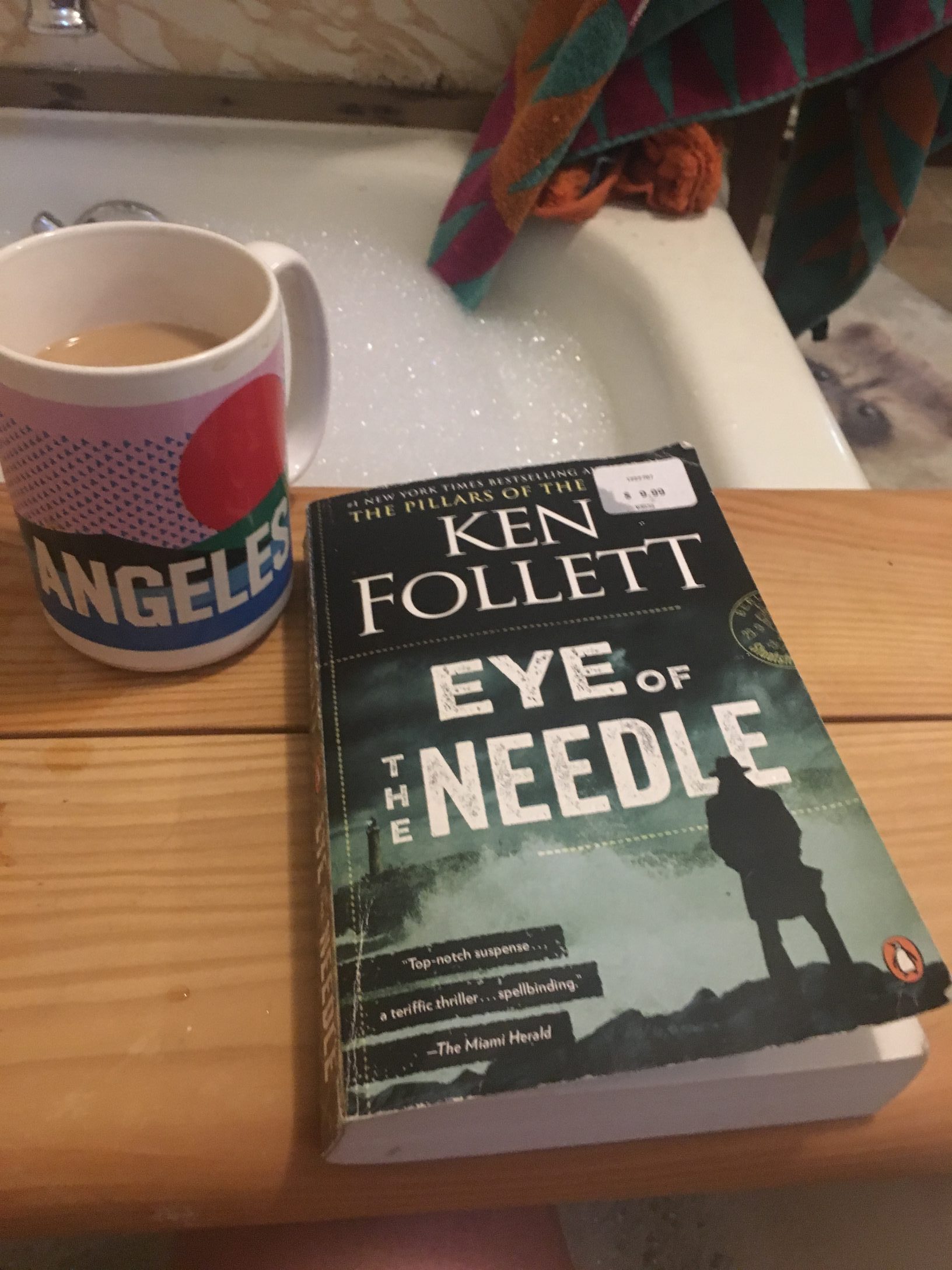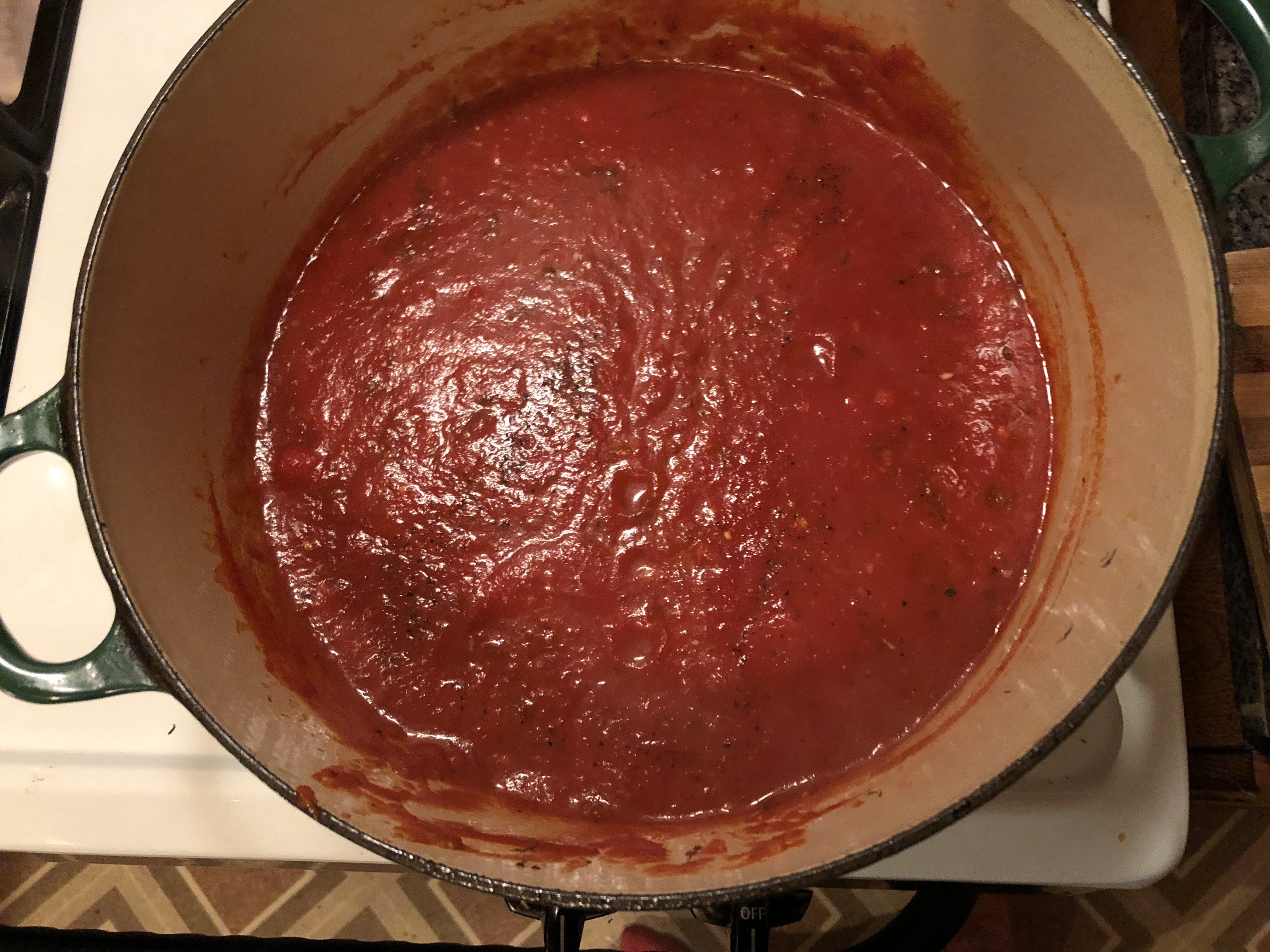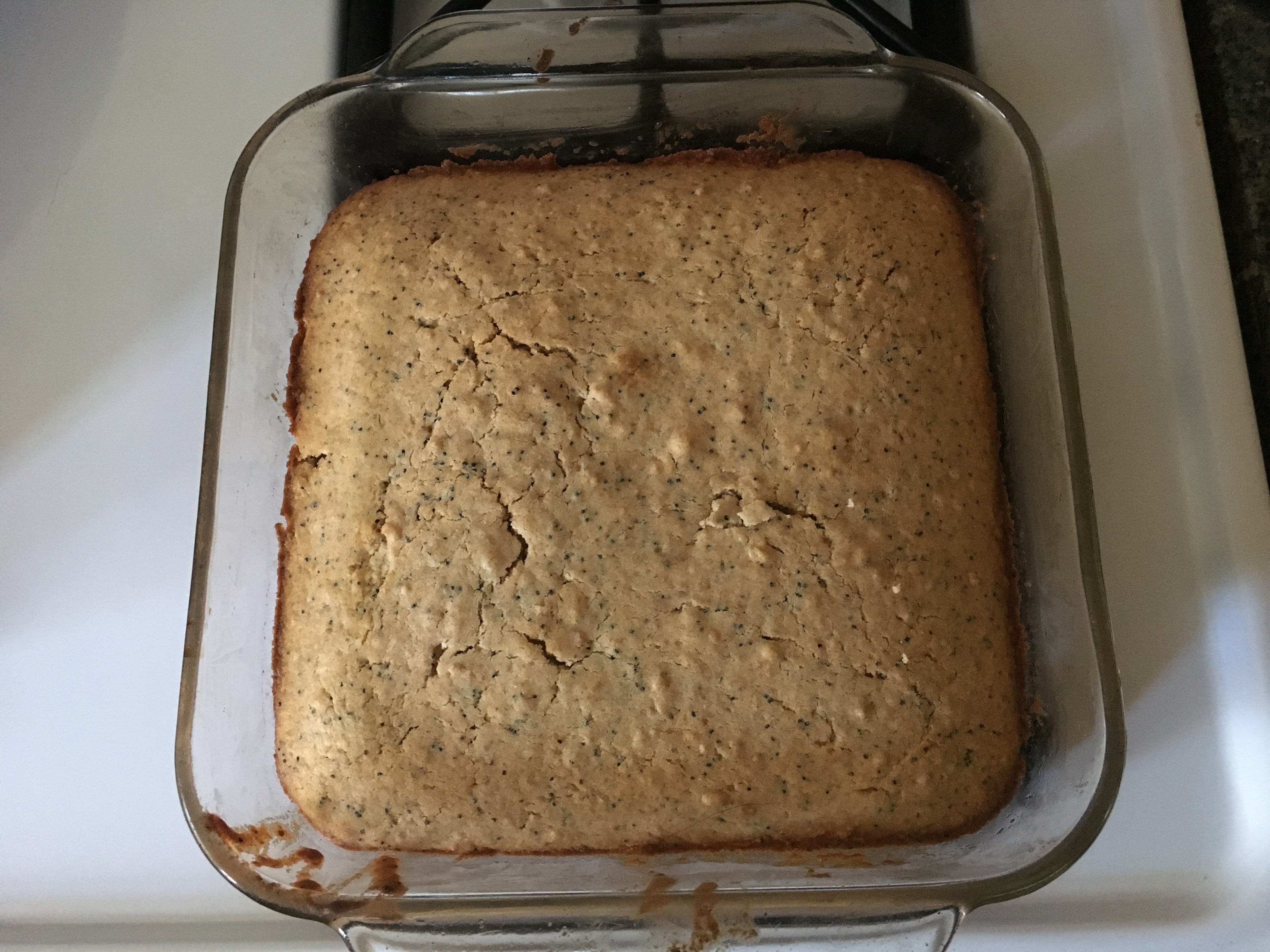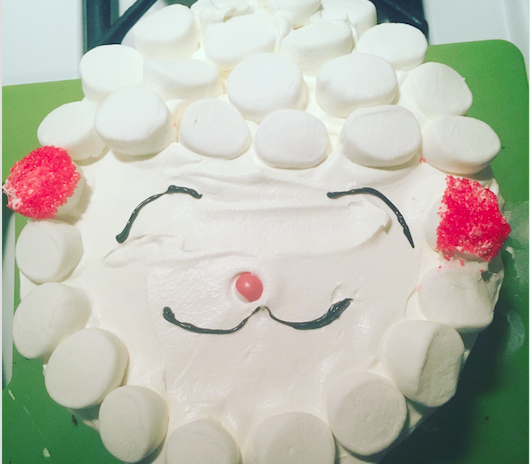Author’s Note. This article was originally published in September 2014, for a long-deceased website called Café. Café did not trouble themselves to archive our work, so we are reprinting it here. Also, the original piece was shorter than this one. This is the unabridged version, because Popula is both pro-archiving, and pro-digressions.
Cooking: Why?
A few weeks ago* I made dinner. I didn’t make anything special, just vegetables and rice. I also made two small fig galettes. Cutting up the vegetables took hours and pieces of them kept falling on the floor. Because of an ant problem the garbage can had been put outside, so over the course of an hour, throwing out vegetable scraps, I probably walked about a mile and a half. It was very hot out and my pastry crust got sticky and my boyfriend helped me roll it out but then he had to run and take a call so I wrestled with it and then just as I put the thing in the oven I realized I’d made the crust with unsalted butter and forgotten to add salt. So although the galette wasn’t going to be ruined it was not going to be the galette of the century, and the galette of the century is the only type of galette I am interested in making. And then I served the dinner and one of my guests didn’t really eat it, and said she didn’t like fennel, which annoyed me. She piled up pieces of fennel at the edge of her plate, and, without wanting to, I thought about how much each of them cost.
When I finally went to bed after hours of cooking and cleaning up, and having achieved absolutely nothing—having impressed no one, including myself, with the food I made—I said to my boyfriend, “Cooking is really stupid.” He said that he knew what I meant. I said that I was never cooking again. He said he thought that was a great idea. I said, “I have to make homemade tomato sauce with Christine on Saturday. And I have to make some more galettes because the last ones sucked.”
“That sounds like a lot of cooking,” he said.
“I know,” I said. “I’m going to make the galettes and the sauce, and then I am never cooking again.”
Cooking: The Humiliation
When I was with the last boyfriend I lived with we spent a lot of time with another couple and their two children, and the wife, Christine, mentioned above, was an amazing cook. Mostly when we ate together I was more than happy to let her cook, but once in a while I cooked, with generally decent results.
And then one night I made a pasta sauce out of carrots. I’d made it before and it was good, but this particular time, it turned out horrible. It was like orange gruel. Actually, it was like goldfish cum.
I watched Christine try to eat it. “This is yummy,” she said in a falsely upbeat tone. The last time we’d eaten with her and her family she’d made an Italian meat gravy so good we were all almost in tears. Her children, who were at that time almost always arguing with each other, were having a rare moment of enjoying each other’s company as they snickered over the awfulness of the food.
My boyfriend was, at this time, in the middle of a long-distance affair I did not know about with someone for whom he would eventually leave me. He was the only one eating, fork moving with dependable loyalty from mouth to plate while everyone else consoled themselves with Christine’s garlic bread. Still, I am absolutely confident that as he ate his mind was hard at work scheming about when he was going to see this woman again. Whenever I think about that moment I feel such shame. I was so stupid to make that sauce, I was so stupid to be cheated on, and these failures were related.
Of course long before my boyfriend cheated on me or before I made awful carrot/goldfish-cum pasta sauce, cooking shame and sexual shame have gone together. For each, you put the very core of yourself out there, in the very pointed attempt to try to give someone a one-of-a-kind sensual experience, and to differentiate yourself, to declare, “Please notice and appreciate my singular talent,” and when at your urging they sample and reject, well, it is not good.
I’d like to add that my then-boyfriend is still with this woman, and that I hope she is cooking for him right now.
Cooking: The Internal Mess, and the External Mess
For most of my youth my family rented a house on Cape Cod owned by a scientist, a professor at an Ivy League university who had written several long books about snails. These books were so boring they didn’t even have photographs of snails, just drawings. We shared the house with another family, and this made a grand total of nine people almost constantly chortling about the poor guy: “Ha ha, what a loser, stupid snail lover!” Years later, my mother was reading the New York Times and there was a picture of him, resplendent, beaming, justifiably pleased with himself for having basically figured out how memory works. In 2000 he won the Nobel Prize.
The house had an enormous kitchen, which was only clean from about 10:45 at night until 7:30 the next morning. As soon as the sun came up, the kitchen was on its way to becoming a disaster, the white stainless steel sink first filled with wet cereal soaking in milk, butter wrappers, spoons smeared with peanut butter, then with crusts and the plasticky edges of bologna, then vegetable peelings and meat bones, and, of course, pounds and pounds of dishes. Its countertops were covered with knives, cheese planers, and hand mixers turned on their backs, dripping with batter. My mother and the mother of the other family were always cleaning. The fathers cleaned too, but not as much.
One of my jobs was to cut the tips off green beans. I tried to outsmart the green beans, lining them up like soldiers and cutting off the bottoms and then lining them up again but my father said that too much of them got cut off that way because I wasn’t fastidious about my lines. I was always looking for a shortcut. Once I put a towel outside on the deck and laid leaves of lettuce on it like tiny green sunbathers. My father poked his head out the screen door. “No,” he said.
My mother was always saying she just wanted to be alone with her book but it seemed like whenever this dream looked as if it might actually become a reality she would decide to make a pie. Flour got everywhere and my mother would say “Shit, shit, shit” as she swept it off the floor and then “Oh CHRIST” when, as she folded the bag closed, more flour would shower itself upon the countertops. Every time you turned the oven on there was a little pond of burnt sugar and fruit smoking on the bottom of it and my mother would have to turn the oven back off and then scrape it—cursing—before she put in a new pie to mess it up again.
I suggested to my mom once that we just buy pies, and she snapped that we couldn’t afford it, and then I said, Well it takes you so long couldn’t you just work extra at your job, and then you could buy them? And then she accused me of not liking her pies that much. This made me really sad, because that’s not what I was saying. I really just wanted her to be happy. I thought summer should be fun, and I didn’t like the parts of it—cutting fucking green beans!—that weren’t fun. And she was an adult. She could actually choose what she wanted. She could choose fun, and it seemed like maybe she didn’t know that, so I was telling her.
In my innocence, I didn’t understand the part of cooking that isn’t about fun or even duty, but is about trying to give someone something only you can give. It is all supposed to appear selfless: “I’m making you this pie so you can enjoy it.” But when, let’s be honest, people would enjoy ice cream just as much, their enjoyment can’t be the whole reason. We cook to make ourselves indispensable and special. I’m not saying that cooking is 100 percent an insidious and underhanded act. Certainly, some part of my mother enjoyed making pies, and probably, when she first learned, she loved it. But then cooking became something to get to the other side of, something to excel at and to get needed praise for, and in the process of doing it, of failing and not getting that praise but instead ending up with something sweated over and uneaten, there is stress. I knew that when she was reading she was happy to think about reading, to read, and to have read, and it made no sense to me: If reading is always good, and cooking is good sometimes, why not just always read?
During the school year, when we were at home, we had a housekeeper. My mother insists the housekeeper wasn’t full time, but there has to be some reason I don’t really know how to make a bed and am not very neat and yet, somehow, also have extremely high standards of cleanliness. The housekeeper made a lot of meals but whenever we said what we were eating was good my mother would point out that she picked out the recipe, and then she would try to convince you that this was important, even though no one cared. My mother thought that meant we didn’t care about her, but that wasn’t it. We just didn’t care where the food came from. People cook—particularly women, but not only women—because they think people are going to notice them, and love them, but no one thinks about who made what they’re eating or how it got on the table. They’re just hungry, and they eat, and they sometimes say thank you, and then they forget about it.

The Good Enough Cook
When I was in college I went to Bogotá for junior year abroad. Unfortunately, 1989 was a violent year for Colombia and right before the fall semester started all the American foreign exchange students were sent back to the United States. There was nowhere left for me in campus housing except for a co-op where people made their own meals. This place had a reputation for being kind of hippied out but really it would have been more accurately categorized as being inhabited by women who were really obsessed with cooking food.
Everyone had a cooking partner and each duo had to cook once every two weeks. Some people—most of them women—would cook all day when it was their turn, and at mealtime produce labored culinary extravaganzas like homemade pizza with homemade crust and sauce. They made pesto. (I didn’t know at the time that this wasn’t that hard, and, I suspect, neither did they.) Two girls, one from New York, one from San Francisco, made homemade pad thai with ingredients they kept in their room, under their beds in sealed plastic tubs. Upper-middle-class and upper-class city girls who live in that same co-op today are probably making bacon-foam gnocchi and panna cotta with rhubarb compote but, again, in 1989, this was all very elaborate.
Still a little shell-shocked from my sudden return to school (and if not, certainly trying to cultivate the outward impression that I was), I had signed up for the very last cooking slot at the end of the two-week cycle. My cooking partner, I was excited to learn, was a girl a year above me named Anna. She was beautiful, and quiet, and grew up on Fifth Avenue, across from the Metropolitan Museum of Art, whereas I was only decent looking, and loud, and grew up in a small, boring town, behind a Talbot’s. I was eager to impress her; she seemed eager to be told what to do. I suggested that she cut up onions. She cut an onion in half and looked at me expectantly. Then she asked, “How long do you cook spaghetti? For a half hour?”
If this had been a cartoon and we had been birds she would have been smaller than me and I would, at that moment, have draped her bony bird shoulders with my huge comforting wing. I thought about trying to teach her to be a good cook, and about how she might be very taken with me if together we made meals that were better than the meals all the other girls were making. But then I thought, You know what? Who cares? I thought about my mother cursing at the ornery flour bag, and how, yes, I might be able to impress people with my cooking and teach Anna to do the same, but then I thought perhaps we could just remove ourselves from all of that. What if we did our job, but didn’t worry about shining?
“You know how everyone here totally freaks out over what they’re cooking and tries to make like the best shit ever?” I said. “We’re not going to do that. We’re going to be totally satisfactory but unremarkable. No one’s ever going to fawn over what we made, but that’s OK, because we won’t be expecting it, so it won’t be missed.”
I think Anna, having never really cooked before, had no idea what I was talking about. She just said, “Fine by me.”
I asked, since we were only cooking once every two weeks, if she’d mind terribly if we just made spaghetti every single time we cooked. That way we would get it down and it would be really easy.
“I seriously don’t give a shit,” she said.
We ended up becoming friends, and she became a real person to me rather than a fascination, and she did learn how to cook. She learned how to cut onions, which, frankly, was kind of too bad for her, because once you learn to do that, you could feasibly show up in heaven and God would be like, “Tell me what you did on this earth,” and you’d be like, “I cut fucking onions.” She learned how to sauté vegetables so that you cooked the hardest ones first, and to add garlic later, and how to make a homemade cake, which, I assured her, was really easy. I was proud of myself, not only for having taught her to cook, but also for having prevented her from becoming too good at it.
I made her promise me she’d never make a pie, and she said not to worry, it would never happen. I think of her every time I make one.
The thing about this story that is disturbing to me is that even in not trying too hard with our co-op cooking duties I was still trying to attract attention. We still had a brand. We were the OK cooks, the cooks that didn’t try that hard, yes, but it was also very important to me that people understood we did three-fourths as good a job as they did in a quarter of the time. My absolute favorite part of our brand was that we never made anything but spaghetti and salad, which was just lettuce with oil and vinegar, though I don’t mind telling you I make very good vinaigrette—my recipe is from Nora Ephron’s 1983 novel Heartburn. I knew that I had really done my job with Anna one day when one of the guys asked her if we had made dessert, and she snorted and said, with that New York accent that only threw her delicate beauty into greater relief, “There are chocolate chips in the freezer.”
Like candy
So, I had promised myself and my boyfriend (who didn’t care if I cooked or not, but would have been a witness to my fickleness/insanity should I decide to change my mind) that I was going to stop cooking, but first I had some cooking obligations. Christine and I got together and spent an entire Saturday making tomato sauce. Even though the tomatoes were very cheap, the price came out to about $10 a jar. We bought 40 pounds of tomatoes, and it made 7½ jars of sauce. We thought we would get about 15 jars. We spent an hour and a half cleaning up the discarded tomato skins and canning equipment and spatter, laughing at our naivete. And then, we made dinner, which, because our sauce was simply a template, calling for more cooking, involved sautéeing some onions and peppers and adding some hot Italian sausage and then stirring in 1/7.5ths of our six or so hours of work.
The sauce was one of the best things I’ve ever had. Christine’s daughter, now older, ate, and said nothing. She was in a bad mood. She left the table early. She wasn’t interested in us and we couldn’t make her be interested in the transcendent food in which we had invested an entire day. I have to say that this sauce was so good someone could have thrown a jar of it at me and screamed “I hate you” and I would have licked it off the broken shards of glass, but I also knew I would probably die without ever making homemade tomato sauce ever again.
I also made a fig galette, and it was perfect enough that I never have to make another fig galette again.
I made my decision not to cook any more two weeks ago, and I have stuck to it. I have a feeling I have done this before, but this time, I really mean it. I am tired of the struggle to win and impress, to even impress myself, to be engaged mentally with food, which, if I just forget about it, will probably just present itself to me anyway. Last night my boyfriend brought home bread and cheese and olives and I made a salad in about 45 seconds. I went to sleep rested and un-buoyed by success and un-flattened by failure. I thought of the snail genius, and how he probably never cooked a day in his life. Cooking tells you too many things about yourself that a busy man like himself very likely didn’t want to bother finding out. It’s funny that even as she is nearing 80, my mother still feels bad that she had a housekeeper, or that she didn’t cook enough, because what I like most and respect most about her is not her cooking but the various ways that she managed to avoid it.

Postscript
I got over this rather vehement stance about not cooking. Also, of course, one must cook to eat, and if I wrote this now I might have taken into consideration the fact that there are places in the world where if you don’t cook, you literally will not eat at all.

That said, I cook less than I used to, rarely try to impress anyone, and look for excuses not to cook rather than the other way around.
Also, finally, I’d like to mention that in a 2017 New York Times piece, Snail Guy hails his wife Denise as “a great cook.“

*[Now more than four years ago, but “a few weeks ago” when I wrote this in 2014.]






